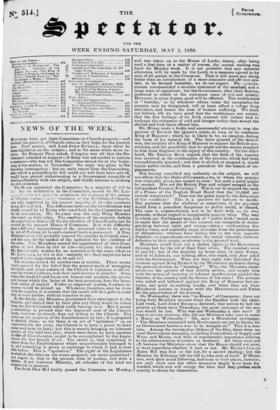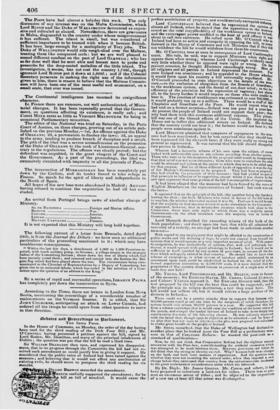NEWS OF THE WEEK.
MINISTERS have got their Committee on Church-property-and shelved the question of Church-rates,as they hope, for the present year. Next session, said Lord JOHN RUSSELL, there must be some legislation on the subject ; and in the mean while more in- auks. Sir ROBERT PEEL asked, if inquiry was all that the Go- vernment intended to suggest-if delay was not needed to mature a measure-why was not this Committee moved for at the begin- ning of the session, in November? No reply was given to the taunting interrogatory : but an early report from the Committee, after which a proceeding by bill could not well have been put off, would have proved embarrassing to a Government incapable of dealing efficiently with the subject, and chiefly anxious to prolong its own existence.
The 1-1 use appointed the Committee by a majority of 277 to :14. • bit an instruction to the Committee, moved by Mr. LID- es.s, s:olv t;ie poss;l.le surplus to the inerea,,e of the means of selisides i,:strusslen ministers (e. the Established Church,
was only negatived by the narrow majsrity of 11-the numbers being 265 and 254. The diffirrence between the two divisions was chiefly caused by 11 Tories who voted both for the Committee and
for the instruction. Mr. CLAYEY was the only Whig. Member who voted on both sides. The smallness of the majority forbids
the expec!atien that a bill fur the abolition of Church-rates can be carried in the present House of Commons. It is with difficulty that a diffieent appropriation of the increased value to be given by act of Parliament to ecclesiastical lands is prevented. A Tory
Administi aGin will probably CODS ert the surplus to Church uses; and this may be the upshot of the agitation for the abolition of the rates. The Ministers carried the appointment of their Com- mittee in last June by 319 to 236-majority S3; they defeated Mr. GOtr.13!*RN'S motion for an instruction to the same effect as Mr. Li ros sr.'s, by 291 to 265 -majority 26 : their majorities have tumbled d wit respectively to 36 and 11! The inquiry cannot be mischievous or useless. There seems ample ground for the belief that the present mode of managing
the lands and other estates of the Church is injurious to all ex- cept the clerical jobbers, and their conkderates in plunder. Even when the landlord and lessee are honest and prudent, the uncer- tain tenure which the latter at the best possesses, bars the bene- ficial outlay of capital. Under an improved system, dormant re- sources would be stirred up. Whatever, therefore, may be dine with the surplus, it is certain that the result will be a gain in some way to some parties, without injustice to any. In the debate, tile Ministers proclaimed their attachment to the Church, and denied that by their plan any thing would be taken from the Est iblishment which really belongs to it. But it seems a subterfuge to pretend that the improved rent of the Church lands, however produced, does not belong to the Church. The rates are the property of the Establishment by law ; it is proposed to abolish them; so far there is an act of "spoliation:" as an equivalent for the rates, the Church is to have a power to draw more rent from its land ; but this is merely bringing an inherent quality of the land into play, which were there no such question as that of Church-rates, ought to be accomplished by the Legis- lature for 11.e benefit of all. The result is, that something is taken from the Establishment which unquestionably belonged to it, and something is given in exchange to which it had a clear
title Wow. This is " spoliation." The right of the Legislature to abolish the rates on the terms proposed, we never questioned : our regret is, that in the present state of parties, and with a feeble, if not insincere Ministry, all schemes of the kind are chimerical in practice.
The Irish Pon Bill finally passed the Commons on Monday,
and was taken up to the House of Lords; where, after being read a first time as a matter of course, the second reading was fixed for Monday week. It is not probable that any material alteration will be made by the Lords in a measure agreed to by men of all parties in the Commune. That it will prove any thing better titan an introduction of a more extensive and efli-ient sys- tem, to be devised hereafter, we do not expect. The :.etnalis- sioners recommended a resolute treatment of the mischief, and a large scale of operations; but the Government, after their fashion preferred to nibble at the enormous mass of evil and misery. However, in some degree, good will be effected. The workhouses or " bastiles," or by whatever odious name the receptacles for paupers may be designated, will at least afford a refuge from starvation, and lessen the sum of human suffering. We shall not believe, till we have proof that the workhouses are empty, that the fine feel.ings of an Irish peasant will induce him to undergo the extremity of cold and hunger rather than accept the shelter and food there offered him.
Mr. HUME made a feeble and unsuccessful attempt to stop the pension of ERNEST the Queen's uncle, so long as he continues King of Hanover ; which he is likely to be, we imagine, during the term of his natural life. The main ground of the motion was, the inability of a King of Hanover to support the British con- stitution, and the possibility that he might use the money supplied to him from England to the injury of this country. On the other hand, Mr. SPRING RICE argued, that the faith of the country was involved in the continuance of the pension, which had been unconditionally granted ; and that to abolish or suspend it, would injure public credit, and form a precedent for the breach of en- gagements. Not having consulted any authority on the subject, we will not affirm that the Duke of CUMBERLAND, to whom the pension was originally given, has ceased to exist : but such a point might be mooted. Has not the British Peer and subject merged in the independent German Sovereign ? Was it not to support the rank of a Prince of the English Blood Royal that the 21,0001. per annum was granted ? Does not the grant lapse by the defessance of the condition ? This is a question for lawyers to decide. The pretence that the abolition or suspension of the payment would form a precedent dangerous to public credit, is absurd. The case is unprecedented, and to be dealt with oa its owu grounds, without regard to inapplicable general rules. The way in which our Parliament men talk of .• public faith," would seem to imply that the people of this country are incapable of distin- guishing between right and wrong-always confounding dis- similar eases, and especially eager to escape from the performance of obligations; whereas their failing lies in the very opposite direction-a superstitious reverence for vested interests, however defective in their origin, or adverse to the general weal.
Ministers would have cut a shabby figure in the Hanoverian division, but for the aid of their Tory allies. The numbers were 97 and 62 ; but of the majority no fewer than 74 were Tories, and of 66 Liberals, not holding office, who voted, only four sided with the Government. Were not they right who described the clamour against King ERNEST by the Ministerial partisans during the general election as " humbug?" Why, the Ministers them- selves are the patrons of that terrible person, and supply him with the means of carrying on infernal machinations against the
liberties of the country and the throne of his niece ! The persons who railed and bellowed against the King of Hanover last au- tumn, are quiet as sucking lambs, now when they see their Ministerial patrons in league with the Hanoverians and Tories for the preservation of his pension.
On Wednesday, there was " no House" of Commons; there not being forty Members present when the Speaker took the chair.
Last week, Lord JOHN RUSSELL declared, that unless he had the priority on three more Thursdays, the great measures of the ses- sion would be lost. Why was last Wednesday a dice non? If
time is so very precious, why (lid not Ministers take care to make a House on Wednesday ? Oh, says a Ministerial newspaper, " The Members connected with Government are not to blame, for no Government business was to be brought on." This is a mis-
take. Among the twenty-four Orders of the Day, there were se- veral Government measures, including Committees of Supply and
Ways and Means, and bills of considerable importance relating
to the administration of justice in Scotland. All these were put off, because the Ministers clause that the House should not meets or were regardless whether it met or not. Mr. HUME'S County Rates Bill was first en the list, for a second reading; but the Member for Kilkenny left his bill to take care of itself. If Minis- ters, with their usual following, had been in their places, howeve-. not only their own but other measures might hove been for warded, which now will occupy the time that they profess such anxiety to obtain fur themselves. The Peers have had almost a holyday this week. The only discussion of any interest was on the Malta Commission, which Lord RIPON and the Duke of WELLINGTON denounced as expen- sive and ridiculed as absurd. Nevertheless, there are grievances in Malta, disgraceful to the country under whose misgovernment it has suffered. The island is small, but was considered of sufficient importance to be treated with when it became British. It has been large enough for a multiplicity of Tory jobs. The Duke of WELLINGTON would ride rough-shod over the Maltese, treating them like conquered serfs: but we are well pleased to record different conduct on the part of Lord GLENELG ; who has So far done well that he sent able and honest men to probe and prescribe for the deep-seated maladies of the little island. The investigation, it seems, has not cost the country 1,7001., though ignorant Lord RIPON put it down at 5,0001.; and if the Colonial Secretary persevere in making the right use of the information given to him, there is reason to believe that the Maltese Commis- sion will have been one of the most useful and economical, on a scull scale, that ever was issued.



























 Previous page
Previous page